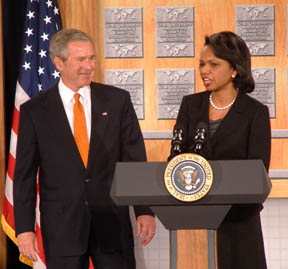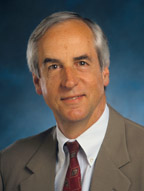University presidents' summit on international education opens in Washington with Rawlings in attendance
By Lauren Gold

Cornell University President Hunter R. Rawlings is one of a select group of 121 university presidents attending the U.S. University Presidents Summit on International Education, which began today (Jan. 5) in Washington, D.C.
The two-day event, organized by the U.S. State Department's Bureau of Educational and Cultural Affairs and co-hosted by Secretary of State Condoleezza Rice and Secretary of Education Margaret Spellings, is focused on strengthening international education at U.S. universities, creating more opportunities for U.S. students to study abroad, and attracting foreign students and faculty to the United States.
The summit, an intensive series of workshops and addresses aimed at encouraging dialogue among participants, will give particular emphasis to studies of Chinese and Middle Eastern languages and cultures.
"Through this summit, Secretary Rice and Secretary Spellings and their respective departments want to reach out to college and university presidents to reinforce a common interest in attracting foreign students and scholars to U.S. institutions," said Karen Hughes, undersecretary of state for public diplomacy and public affairs, in a State Department release. "Of equal importance is seeking investment in educating globally competitive U.S. students to work in fields of international interest."

President George W. Bush was expected to open the summit today with a speech announcing major new funding for international studies at universities across the country. Much of the proposed cost of the new programs, according to reports in The Baltimore Sun, will be shouldered by the Pentagon.
In an interview Jan. 4, Rawlings said that the summit offers a unique opportunity to participate in the public dialogue, adding that he looks forward to working with other university presidents and the Bush administration to shape international education in the future.
"The whole thing is rather unusual," Rawlings said. "When was the last time a secretary of state and secretary of education called together dozens and dozens of college presidents [to discuss improving higher education]?
"The agenda looks pretty rich," Rawlings added, noting that workshop topics range from encouraging U.S. students to spend part of their studies abroad to simplifying the visa application process for foreign students.
"I'd like to be part of the ideas that lead to formulating these programs," Rawlings said. "We're not going to take things already formed; we're going to have universities contribute to the shaping of these programs."
As a university with a strong global presence, Rawlings said, Cornell has been offering a wide variety of foreign languages and cultural studies for decades. Rawlings pointed to two recent programs as examples: the curriculum laid out in a 2004 agreement between former Cornell President Jeffrey Lehman and Su Guaning, president of Singapore's Nanyang Technological University (NTU) to create a joint master's degree program in hospitality management; and this year's addition of the China and Asia-Pacific Studies (CAPS) program. The establishment of these programs show that international education at Cornell continues to excel, Rawlings said.
"CAPS is a splendid example of what American universities should be doing," Rawlings said. "We're a little ahead of the curve, and I'm very pleased about that."
"Cornell is already very strong in language instruction and area studies," added David Wippman, vice provost for international relations at Cornell. "We're hoping this will strengthen our ability to offer instruction in those areas."
Media Contact
Sabina Lee
Get Cornell news delivered right to your inbox.
Subscribe